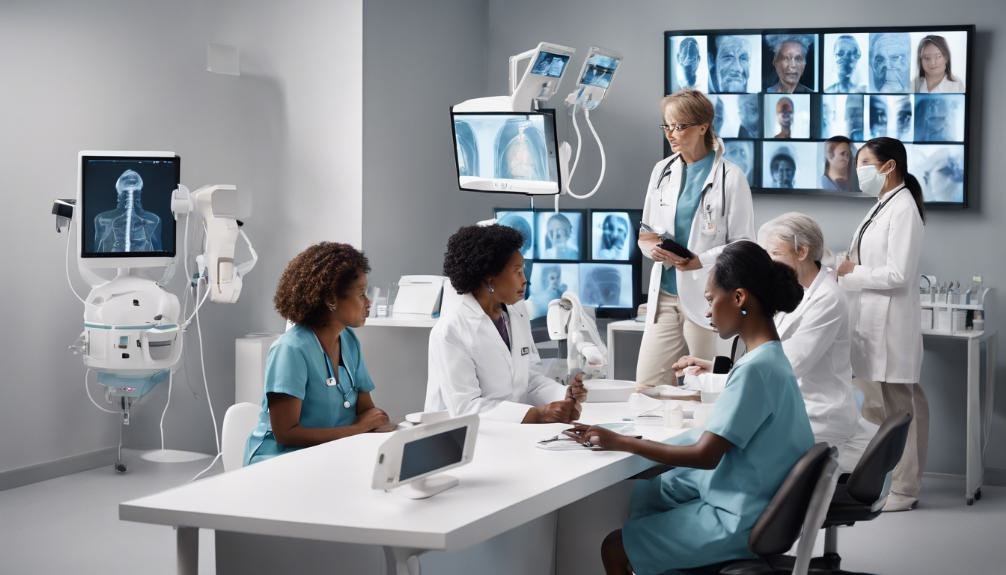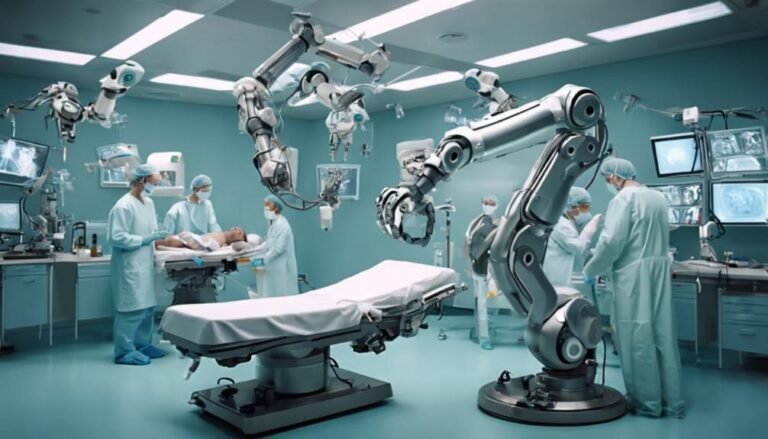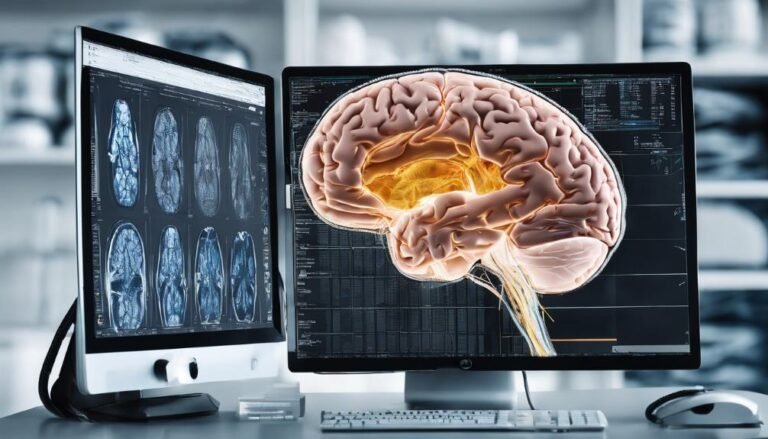AI for Early Disease Detection
Imagine a world where technology can predict health risks before symptoms even surface. AI's potential in early disease detection has sparked significant interest among healthcare professionals and researchers alike. The ability to analyze vast datasets and identify patterns that escape the human eye has opened new doors in preventive medicine. But how reliable is this technology, and what are the ethical implications of relying on algorithms to make life-changing decisions? Stay tuned to explore the intricate web of AI in early disease detection and the implications it holds for the future of healthcare.
Key Takeaways
- AI enhances diagnostic accuracy for early disease detection.
- Machine learning algorithms improve efficiency in screening.
- Predictive analytics assess risks for timely interventions.
- AI analyzes medical imaging for abnormalities.
- Data privacy measures are crucial for AI in healthcare.
The Role of AI in Healthcare
AI plays a pivotal role in revolutionizing the healthcare industry by enhancing diagnostic accuracy and efficiency. Through the implementation of machine learning algorithms, AI can analyze vast amounts of medical data to identify patterns and make predictions that aid in early disease detection. However, with this increased reliance on AI comes the critical concern of data privacy. Safeguarding patient information is paramount to maintaining trust in the healthcare system. Implementing robust data encryption and access controls is essential to make sure that sensitive medical data remains secure and confidential.
Machine learning algorithms enable AI systems to continuously learn and improve their diagnostic capabilities. This iterative process enhances the accuracy of disease detection and can lead to earlier intervention and treatment, ultimately improving patient outcomes. By leveraging AI technologies, healthcare providers can streamline workflows, reduce diagnostic errors, and optimize treatment plans.
As AI continues to advance, it's important to prioritize data privacy measures to uphold patient trust and confidentiality in the healthcare sector.
Benefits of Early Disease Detection
In healthcare, early disease detection offers numerous benefits that can greatly impact patient outcomes and overall healthcare costs. Detecting diseases at an early stage allows for the implementation of effective prevention strategies, such as lifestyle modifications, targeted screenings, and early interventions. By identifying health issues before they progress, individuals have a higher chance of successful treatment and improved outcomes.
Early disease detection also plays a significant role in reducing healthcare costs. By catching diseases in their initial stages, patients may require less intensive and costly treatments compared to advanced disease stages. This not only benefits the individual's financial burden but also contributes to the overall sustainability of the healthcare system.
Moreover, early detection can lead to better quality of life for patients. Timely interventions can prevent complications and long-term health issues, enabling individuals to maintain their well-being and productivity. Ultimately, the ripple effects of early disease detection extend beyond individual patients, positively impacting communities and healthcare systems as a whole.
AI Technologies for Disease Screening
Utilizing advanced algorithms and machine learning capabilities, modern AI technologies have revolutionized disease screening methods, enhancing the accuracy and efficiency of early detection processes.
In the domain of medical imaging, AI plays a vital role in analyzing scans for abnormalities that may indicate the presence of diseases such as cancer. Through machine learning algorithms, AI can quickly identify patterns and anomalies in images, aiding in the early diagnosis of conditions that may otherwise go unnoticed.
Furthermore, predictive analytics powered by AI can analyze vast amounts of patient data to assess the likelihood of developing certain diseases based on genetic factors, lifestyle choices, and medical history. By integrating genetic screening results with predictive analytics, AI can offer personalized risk assessments, enabling healthcare providers to implement proactive measures for disease prevention and early intervention.
In essence, AI technologies, through machine learning and predictive analytics, are transforming disease screening by providing accurate assessments and personalized insights that empower early detection and intervention strategies.
Challenges and Limitations of AI
While AI technologies have shown significant promise in enhancing disease screening processes, several challenges and limitations must be addressed to guarantee their effective implementation in healthcare settings. Ethical considerations play a vital role in the development and deployment of AI for early disease detection. Issues such as bias in algorithms, accountability for decisions made by AI systems, and the potential replacement of human judgment with automated processes raise important ethical questions that need careful consideration.
Moreover, data privacy is a major concern when utilizing AI for disease detection. Health data is sensitive and must be handled with the utmost care to safeguard patient confidentiality and comply with regulations like the Health Insurance Portability and Accountability Act (HIPAA). Safeguards must be put in place to protect against data breaches and unauthorized access to personal health information, emphasizing the importance of robust data security measures in AI applications for healthcare.
Addressing these challenges and limitations is essential to harnessing the full potential of AI for early disease detection while maintaining trust and integrity in healthcare practices.
Future Implications and Opportunities
AI's potential for early disease detection lies in its ability to analyze vast amounts of data rapidly and accurately, paving the way for proactive healthcare interventions. However, with this promising technology come important future implications and opportunities that must be carefully considered.
Ethical considerations are paramount when integrating AI into early disease detection systems. Ensuring patient autonomy, informed consent, and transparency in AI decision-making processes are vital. Additionally, safeguarding data privacy is essential to maintain patient trust and confidentiality.
On the economic front, the widespread adoption of AI in healthcare may have significant impacts. While it can lead to cost savings and improved efficiency in disease detection and management, there's a possibility of job displacement for healthcare workers whose roles may be automated by AI systems. This calls for strategic workforce planning and retraining programs to mitigate potential negative consequences.
Navigating these ethical and economic challenges while harnessing the full potential of AI for early disease detection presents a complex but rewarding opportunity for the future of healthcare.
Conclusion
To sum up, AI for early disease detection acts as a vigilant guardian, tirelessly scanning through vast amounts of medical data to uncover hidden threats before they manifest.
By leveraging advanced algorithms and machine learning, this technology offers a proactive approach to healthcare, enabling timely interventions and personalized insights for improved patient outcomes.
Despite challenges, the potential of AI in transforming disease screening is vast, promising a future where diseases can be detected and addressed at their earliest stages.







